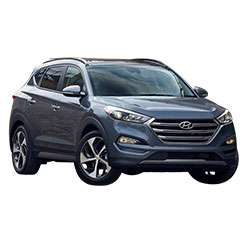2017 Hyundai Tucson Pros vs Cons

What's New?
Hyundai largely left well enough alone for the 2017 version of the Tucson. However, the manufacturer did perform some much-needed updates to interior quality and tech features, and they are very appreciated. Otherwise, this Hyundai Tucson is largely unchanged from the previous year.
Ten Reasons You May Like the 2017 Hyundai Tucson – The Pros
Here are 10 reasons to consider buying the 2017 Tucson:
1. Delightfully Comfortable Ride
One of the best things about this Hyundai Tucson is its ride quality. When equipped with either engine, it delivers a comfortable, sporty ride, and it manages cornering well. Upgrading to the turbocharged engine enhances ride quality further, delivering a little more pep without negatively impacting fuel efficiency. Thanks to the small size, this car is also a breeze to maneuver around--even in very tight spaces.
2. Available Turbocharged Engine
The 2017 Hyundai Tucson is offered in 4 trim designs: the SE, Eco, Sport, and Limited. The SE gets a 2.0-liter 4-cylinder engine with a six speed automatic transmission. All others get the 1.6-liter 4-cylinder turbocharged engine, which delivers 175 horsepower and 195 pound-feet of torque. When combined with the seven-speed dual-clutch automatic transmission and front-wheel drive, it allows the Tucson to accelerate from zero to 60 in just under 8 seconds.
3. Superior Safety
In terms of safety, the 2017 version of the Tucson is a major standout. It earned the highest possible marks in government crash tests, including five out of five for overall crash protection and five out of five for front and side crash protection. It earned similarly high ratings from the Insurance Institute for Highway Safety.
This Kia crossover also comes standard with an array of great safety features, including antilock disc brakes, active front head restraints, rearview camera, traction and stability control, hill descent control, hill-hold assist, side curtain airbags and front side airbags.
4. Generously Appointed
For the most part, this vehicle offers plenty of standard features. The base trim, the SE, comes with heated mirrors, a 5" touchscreen, a height-adjustable driver's seat, Bluetooth, a 60/40-split folding backseat and a six-speaker stereo system with USB, a CD player and an auxiliary audio jack. Unfortunately, some fairly standard features are only available on higher trims.
5. Versatile Options
Although some trims of the Tucson are conspicuously missing certain features, this can often be overcome by adding one of several options packages. The most popular one, which is aptly called the Popular package, includes LED daytime running lights, premium side sills, drive mode select, driver window auto up/down, illuminated glove box, power driver's seat with lumbar support, halogen fog lamps and dual illuminated vanity mirrors.
6. Solid Fuel Economy
The 2017 Tucson doesn't offer the best fuel economy in its class, but it still holds its own in this department. The base model and engine deliver a combined fuel economy of 23 mpg, with 21 mpg in the city and 26 mpg on the highway. Again, the turbocharged engine outshines the base engine in this regard as well, giving all-wheel-drive versions of the Sport and Limited a combined fuel economy of 25 mpg, with 24 mpg in the city and 28 mpg on the highway.
7. Ample Cargo and Storage Space
The latest Hyundai Tucson offers decent amounts of cargo and storage space. Behind the backseat, there's 31 cubic feet of cargo space. When that back seat is folded down, that figure jumps to 61.9 cubic feet, which still pales in comparison to the Honda CR-V, which offers 70.9 cubic feet with its rear seat folded. This is partly made up for by the many convenient storage nooks and crannies that are scattered throughout the vehicle.
8. Cutting-Edge Technology
Base models of this Hyundai vehicle include a 5" touchscreen that is intuitive and easy to use. Those who want the latest and best technology should consider the Limited model. It is the only trim that offers the BlueLink telematics suite, which includes emergency safety assistance and other services via a connected mobile app.
9. Quick Acceleration
Other than the base model, which has the less peppy 2.0-liter engine, the 2017 Hyundai Tucson offers quick, responsive acceleration. As mentioned previously, it can zoom from zero to 60 in just 7.9 seconds, so it's well worth it to upgrade to anything but the base trim.
10. Nice Dashboard
The dashboard of the 2017 version of this popular crossover is well-designed and logical. Everything is within easy reach. Thanks to the intuitive design, the controls are easy to learn and remember.
Reasons You May Not Like the 2017 Hyundai Tucson – The Cons
A few issues that may give you second thoughts about buying this Hyundai crossover include:
1. Low Materials Quality
Especially on the base trim, this SUV wildly misses the mark in terms of materials quality. Indeed, the base SE model is overrun with cheap, hard plastics that majorly detract from its aesthetics and comfort.
2. Lackluster Base Engine
As mentioned throughout this review, the 2.0-liter engine that comes with the base model isn't really worth it. While driving this car, the engine just doesn't seem to deliver enough power when it's needed most.
3. Lack of Standard Features
Finally, the way in which features are arranged across the trim levels of the 2017 Hyundai Tucson isn't very logical. Options packages help, but it's still easy to end up with something that's almost perfect--but not quite.
Conclusion
Although the 2017 Hyundai Tucson isn't the absolute best in its class, it still delivers enough features and perks to make it a worthwhile option to consider.
• Why buy a 2014 Hyundai Tucson? w/ pros vs cons.
• Why buy a 2015 Hyundai Tucson? w/ pros vs cons.
• Why buy a 2016 Hyundai Tucson? w/ pros vs cons.

